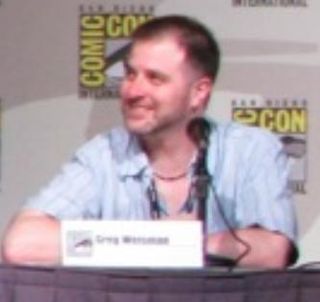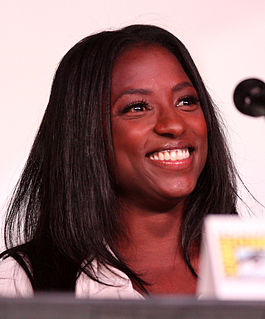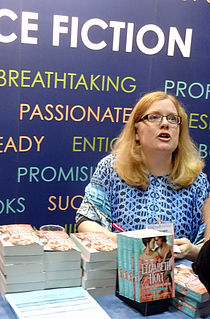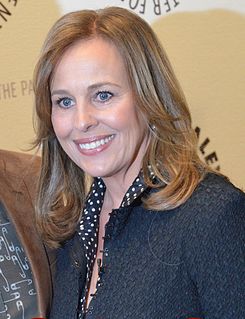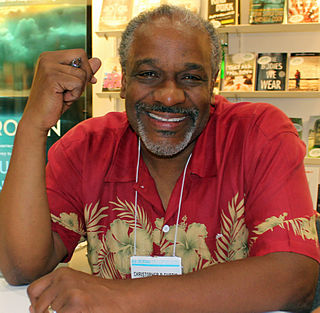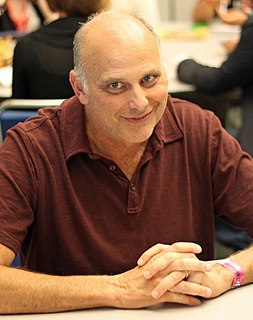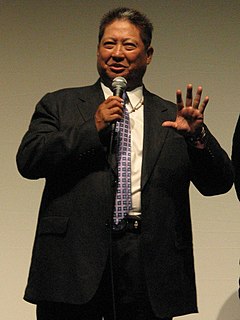A Quote by Greg Weisman
I had co-written one episode of an animated show called Jem and the Holograms. Which at the time I didn't view as the start of a career, I viewed it as, "Hey, someone wants to pay me to write something, and I might get a TV credit, isn't that cool?" So I did it with my writing partner at the time, Cary Bates, and it was interesting but it didn't lead to anything and I didn't think too much about it.
Related Quotes
I pretty much started out writing full time. I was an at-home mom and when my youngest entered kindergarten, I started writing. I was 35, and before that I really hadn't written at all. Which means, I guess, that a) it's never too late to start a writing career (or any career you really want) and b) it's OK to get to your mid-30s and still not know what you want to be when you grow up.
I have an appearance on a new TV show called 'Bar Karma' on Current TV. I had the most fun ever making this episode. I play someone with a multiple personality, and I think my fans will be surprised and get a real giggle out of it. It's a new model for TV in that it is interactive with the community.
I would say just start writing. You've got to write every day. Copy someone that you like if you think that perhaps could become your sound, too. I did that with Hemingway, and I thought I was writing just like Hemingway. Then all of a sudden it occurred to me - he didn't have a sense of humor. I don't know anything he's written that's funny.
Everyone always asks, was he mad at you for writing the book? and I have to say, Yes, yes, he was. He still is. It is one of the most fascinating things to me about the whole episode: he cheated on me, and then got to behave as if he was the one who had been wronged because I wrote about it! I mean, it's not as if I wasn't a writer. It's not as if I hadn't often written about myself. I'd even written about him. What did he think was going to happen? That I would take a vow of silence for the first time in my life? "
When we came to the network, it was a very interesting time where Portlandia had just come on the air and had been very, very successful. I think people had Portlandia-sized expectations for Comedy Bang! Bang!, especially after the first episode was sampled by quite a large number of people. I remember getting the ratings after the first episode, and the network was over the moon about it. And then the second episode tanked so hard. Like, no one watched it. It was a resounding, "Hey, a bunch of people tried your show, and they all hate it!"
I try to make the writing as regular and regimented as possible. I usually get up at around 5 a.m. and read what I wrote the day before. Some of the time, after I read, I think the writing's very good and some of the time I feel embarrassed by what I've written. You have to learn not to pay too much attention to these feelings.
I never intended to have a career as a journalist, writing about people who make movies. I did it as something that was really rewarding to do, given the opportunity to express myself about something I cared about, and also to learn a lot by watching filmmakers I admired. In a sense, it was my film school. After doing it for a few years, I decided that the time had come to get it together and do some work of my own. Even for a cheap movie, you need film stock and equipment and actors. Whereas to write, all you need is paper and an idea, so I felt that writing might be my stepping stone.
I don't write because I think I have anything particularly interesting to say. I write because I love writing more than any other work I've done. I do think about entertaining the reader to the extent that I try always to write a book that I myself would want to read, but I don't think it's up for me to decide if what I've written is interesting to others. That is entirely up to others.
I'm a better musician now, and I rarely practice because age has taught me the value of economy. And I think I'm a better writer now because I don't waste as much time, dilly-dallying and sassafrassin' and sloop and sloppin' and frying eggs. When you start writing, half the time you're just saying howdy to the page. My process now is a little more lean and muscular. I don't waste a lot of time. When I had kids, I learned how much time I had before, and how much time you actually need to do something. If you don't have time, you'll just do it and get it done.
The parts that embarrass you the most are usually the most interesting poetically, are usually the most naked of all, the rawest, the goofiest, the strangest and most eccentric and at the same time, most representative, most universal... That was something I earned from Kerouac, which was that spontaneous writing could be embarrassing... The cure for that is to write the thing down which you will not publish and which you won't show people. To write secretly... so you can actually be free to say anything you want.
When looking for a life partner, my advice to women is date all of them: the bad boys, the cool boys, the commitment-phobic boys, the crazy boys. But do not marry them. The things that make the bad boys sexy do not make them good husbands. When it comes time to settle down, find someone who wants an equal partner. Someone who thinks women should be smart, opinionated and ambitious. Someone who values fairness and expects or, even better, wants to do his share in the home. These men exist and, trust me, over time, nothing is sexier.
It's a strange thing to have a successful television show because if it's too interesting... people don't really pay attention when they watch TV. It has to be good, but not so interesting that you really have to pay attention because people multitask. So, if a show demands your entire attention, it has a tough time making it.
